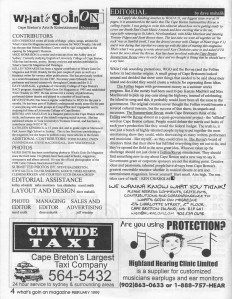 As I apply the finishing touches to WGO # 31, our biggest issue ever at 36 pages, it is announced on the radio that The Cape Breton Summertime Revue is calling it quits. I was going to write this editorial about how we’re getting ready to cover our fourth East Coast Music Awards and how exciting that is for me, especially returning to St. John’s, Newfoundland, with Mike Morrison and meeting Tommy Fidgen and Scott Brown there. The last time we were all together on ‘the rock’ was as Sunfish (well, I was the driver) on tour with Change of Heart (wgo # 1) and it was during that trip that we came up with the idea of starting this magazine. That’s what I was going to write about until Ken Chisholm came in and asked if I’d heard the news about the Revue. Ken has been involved with the Cape Breton Summertime Revue since its early days and we thought it fitting that he should have a say here. – dave
As I apply the finishing touches to WGO # 31, our biggest issue ever at 36 pages, it is announced on the radio that The Cape Breton Summertime Revue is calling it quits. I was going to write this editorial about how we’re getting ready to cover our fourth East Coast Music Awards and how exciting that is for me, especially returning to St. John’s, Newfoundland, with Mike Morrison and meeting Tommy Fidgen and Scott Brown there. The last time we were all together on ‘the rock’ was as Sunfish (well, I was the driver) on tour with Change of Heart (wgo # 1) and it was during that trip that we came up with the idea of starting this magazine. That’s what I was going to write about until Ken Chisholm came in and asked if I’d heard the news about the Revue. Ken has been involved with the Cape Breton Summertime Revue since its early days and we thought it fitting that he should have a say here. – dave
While I risk sounding pretentious, WGO and the Revue (and the Follies before it) had similar origins. A small group of Cape Bretoners looked around and decided that there were things that needed to be said about their island and decided they would create a vehicle for expressing these ideas.
The Follies began with government money as a summer works program. But if the money had been used to pay Kenzie MacNeil and Max MacDonald to pick up pop cans along the highway, instead of celebrating the island in song and skit, it probably would have been all the same to the government. The original creators never thought the Follies would become a revered cultural treasure, but the success of that show, its sequels and successor, The Summertime Revue, made Cape Bretoners think of the Follies and the Revue almost as a quasi-governmental project – the “official” word on Cape Breton culture. People would debate the merits and faults of each year’s production like they would the federal budget. The truth is, it was just a bunch of highly talented people trying to put together the most entertaining show they could, while showcasing as many writers, performers and musicians – like myself – as they could cram in. The Revue’s board of directors think that their show has fulfilled everything they set out to do, and they’ve opened the field to the next great idea. Whoever takes up the challenge should not just clone a Follies/Revue simulacrum. They should find something new to say about Cape Breton and a new way to say it. Government grant or corporate sponsors are not the starting point. Creative ideas and passionate, talented people have always been Cape Breton’s greatest renewable resource whether in musical theatre or arts and entertainment magazines. Invest yourself. Start small. Aim high. The rest takes care of itself. – Ken Chisholm

